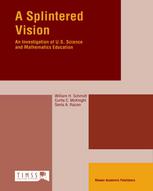

Most ebook files are in PDF format, so you can easily read them using various software such as Foxit Reader or directly on the Google Chrome browser.
Some ebook files are released by publishers in other formats such as .awz, .mobi, .epub, .fb2, etc. You may need to install specific software to read these formats on mobile/PC, such as Calibre.
Please read the tutorial at this link: https://ebookbell.com/faq
We offer FREE conversion to the popular formats you request; however, this may take some time. Therefore, right after payment, please email us, and we will try to provide the service as quickly as possible.
For some exceptional file formats or broken links (if any), please refrain from opening any disputes. Instead, email us first, and we will try to assist within a maximum of 6 hours.
EbookBell Team

4.0
96 reviewsA Splintered Vision: An Investigation of U.S. Science and MathematicsEducation is the US report on the curriculum analysis component of the Third International Mathematics and Science Study (TIMSS) which was sponsored by the International Association for the Evaluation of Educational Achievement (IEA).
The report summarizes data from the TIMSS curriculum analysis and integrates it with teacher questionnaire data from the US, Japan, and Germany on science and mathematics topic coverage and instructional practices.
The authors of A Splintered Vision discuss and provide evidence of the unfocused nature of US mathematics and science curricular intentions, textbooks, and teacher practices. They offer the premise that producers of US textbooks and curriculum guides have attempted to answer calls for curricular reform by adding new content to already existing materials instead of devoting time to restructuring the materials. The authors also suggest that US teachers, inundated with a myriad of competing visions, are attempting to cover all the topics they confront in their resource documents and to meet all the instructional demands placed on them by those with a stake in education. In keeping with the `incremental assembly line' philosophy in American society, US teachers also tend to lean toward a piecemeal approach to education. The authors speculate on what such practices may mean for the mathematics and science achievement of US students.
The work is sure to spur discussion among educational researchers, policy makers, and others concerned about the future of mathematics and science education in the US.